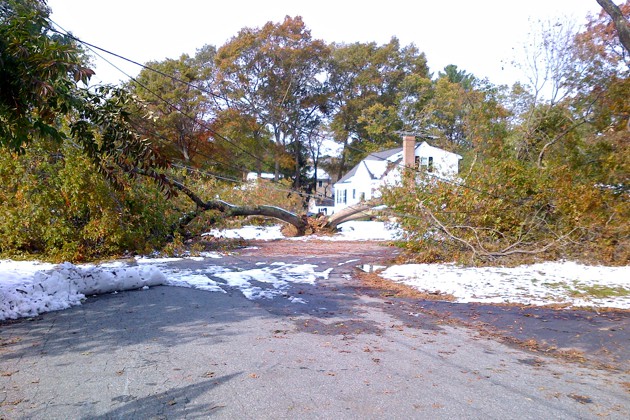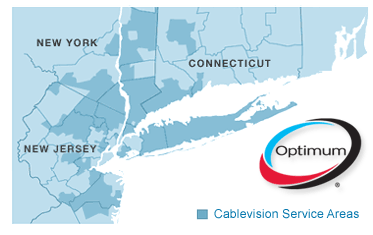
Storm damage in eastern Massachusetts. (Courtesy: WGBH Boston)
The northeastern United States got more than its fair share of severe storms these past few months. Remnants of Hurricane Irene caused severe flooding, heavy rainstorms that followed didn’t help. But one of the worst of all was the Halloween Nor’easter that left serious wind damage in some areas, heavy snowfall in others, leaving customers without power, phone, cable, and broadband service for days, if not weeks.
Telecommunications companies including Cablevision, Charter Communications, Comcast, Cox Communications, Dish Network, Time Warner Cable, and Metrocast Communications of Connecticut are under fire across the region for not providing automatic service credits for impacted customers. Charter and Comcast are both facing a class action lawsuit filed last week by a Massachusetts law firm that accuses the cable operators of “gouging” their customers by not automatically crediting affected subscribers for lost service.
Jeffrey Morneau of Springfield, Mass. law firm Connor, Morneau & Olin says up to 1.2 million Charter and Comcast customers were without service, but the companies will only provide credits on a case-by-case basis, and only if customers request them within a short time after the outage occurred.
“If you pay for a service and you don’t get it, the company can’t keep your money,” Morneau said.
Stop the Cap! readers in Massachusetts and New Hampshire report Comcast will grant reasonable service credit requests, assuming you get through to ask for them.
“Hold times are epic,” reports Tom Turlin, a Comcast customer in Massachusetts. “I managed to get my credit by using their web contact form instead.”
Most providers require consumers to request credits for outages within 30-60 days of the service interruption, and time is running out for Nor’easter credits.
“Most people think they will only get 50 cents back so why bother, but actually with today’s huge cable bills, credits can be substantial,” Turlin says. “I received almost $15 back on my bill.”
Only AT&T, Connecticut’s largest phone company, agreed to automatically credit customers the company determined were without service for at least 24 hours. Customers who don’t receive credit automatically can appeal to the company for credit they believe they are entitled to receive.
Here’s how different companies are responding:
AT&T: “We will give U-verse TV customers in Connecticut who experience a service outage for longer than 24 hours a pro-rated credit,” AT&T said. “In addition, we will voluntarily give similar credits for U-verse Voice and U-verse High Speed Internet service customers who experienced a service outage for longer than 24 hours. Customers are not required to take any action: the credits will be applied automatically on the customer bill for impacted customers within the next several billing cycles.”
Cablevision: “While state law provides for consumer credits for qualifying outages for cable service only, Cablevision has been providing a credit to customers on an individualized basis for all their services,” Cablevision said. “Customers will be credited when they notify us that they had a service outage. We are extending our normal period to request refunds to 45 days from the date of the storm.”
Charter: Customers must call or visit the cable company offices in person to request service credit. “We are providing credit to customers for the entire time they were without service, from the time they lost power to the time their Charter services were fully restored, and we are providing credit for all services,” Charter said.
Comcast: “In order to receive a credit, a customer must contact Comcast and identify the time period during which they did not have access to Comcast services,” Comcast said.
Cox: “We need our customers to call us after their service is restored to report that they were without Cox services, and for how long,” Cox said. “We then credit their accounts from the time of the service outage until service was actually restored.”
DISH Network: The satellite provider is waiving service and equipment fees for consumers who need their equipment realigned, reinstalled or repaired due to the storm. “DISH subscribers who indicated that they were without service due to the storm were provided a credit for their time without service,” DISH said. “In addition, DISH subscribers who needed to suspend their service due to storm damage were allowed to do so at no charge.”
MetroCast Communications of Connecticut: It will provide customers with a refund on their next invoice after contacting the company. “The credit equals a prorated amount of the affected customer’s monthly charges for all MetroCast services, calculated based on the number of days during which such services were interrupted, and are included in the customer’s next invoice,” MetroCast said.
Time Warner Cable: Customers must contact the cable company online, by e-mail or phone and request credit for the number of days they were without service. Most service credit requests that can be verified are granted within hours, and will appear on the next billing statement.
[flv width=”640″ height=”380″]http://www.phillipdampier.com/video/WSHM Springfield City councilor Comcast disagree on cable rebates 11-21-11.mp4[/flv]
WSHM in Springfield covers the ongoing dispute city officials have with Comcast, who is refusing to automatically provide storm credits to customers impacted by the October Nor’easter. (2 minutes)


 Subscribe
Subscribe





